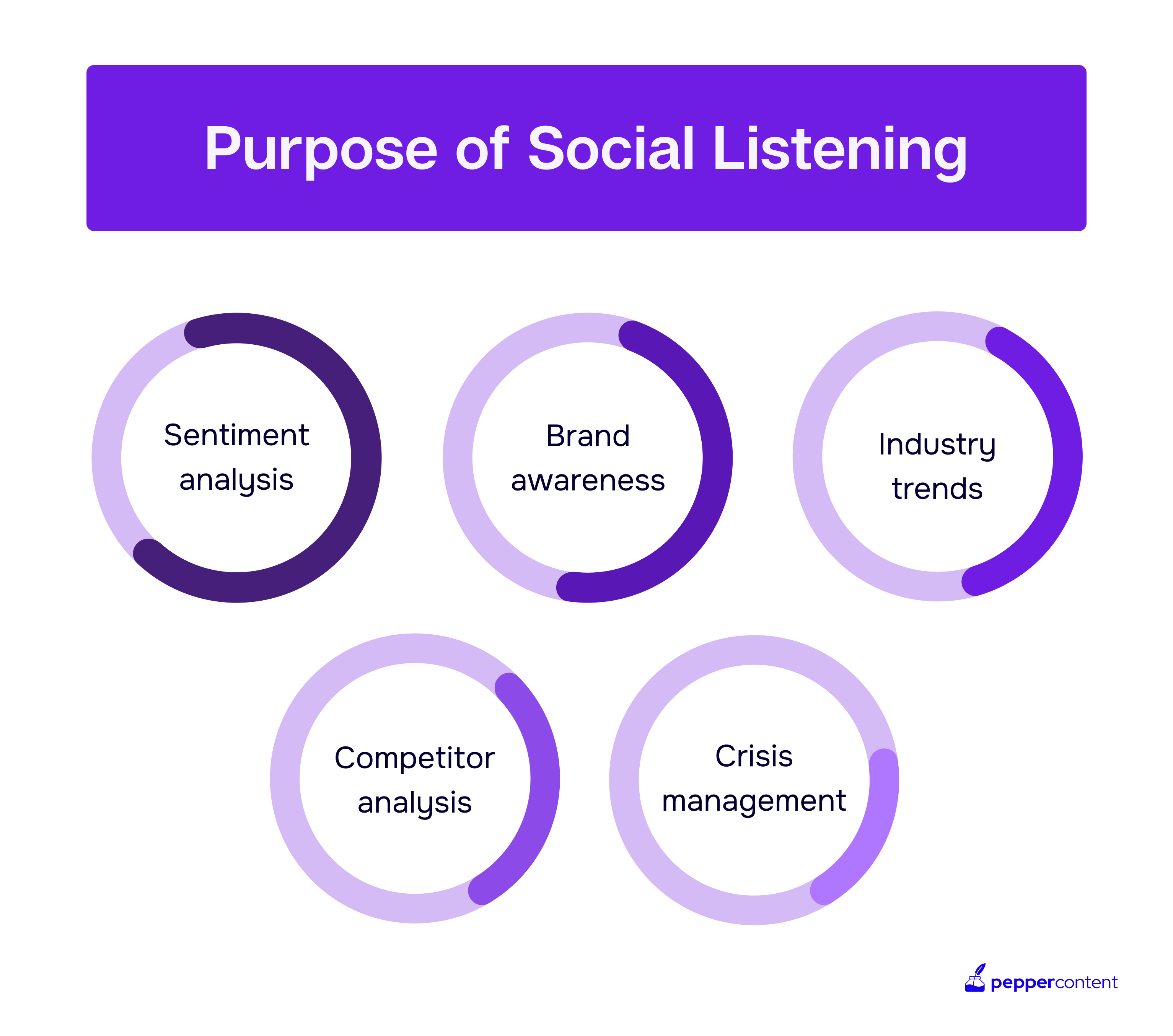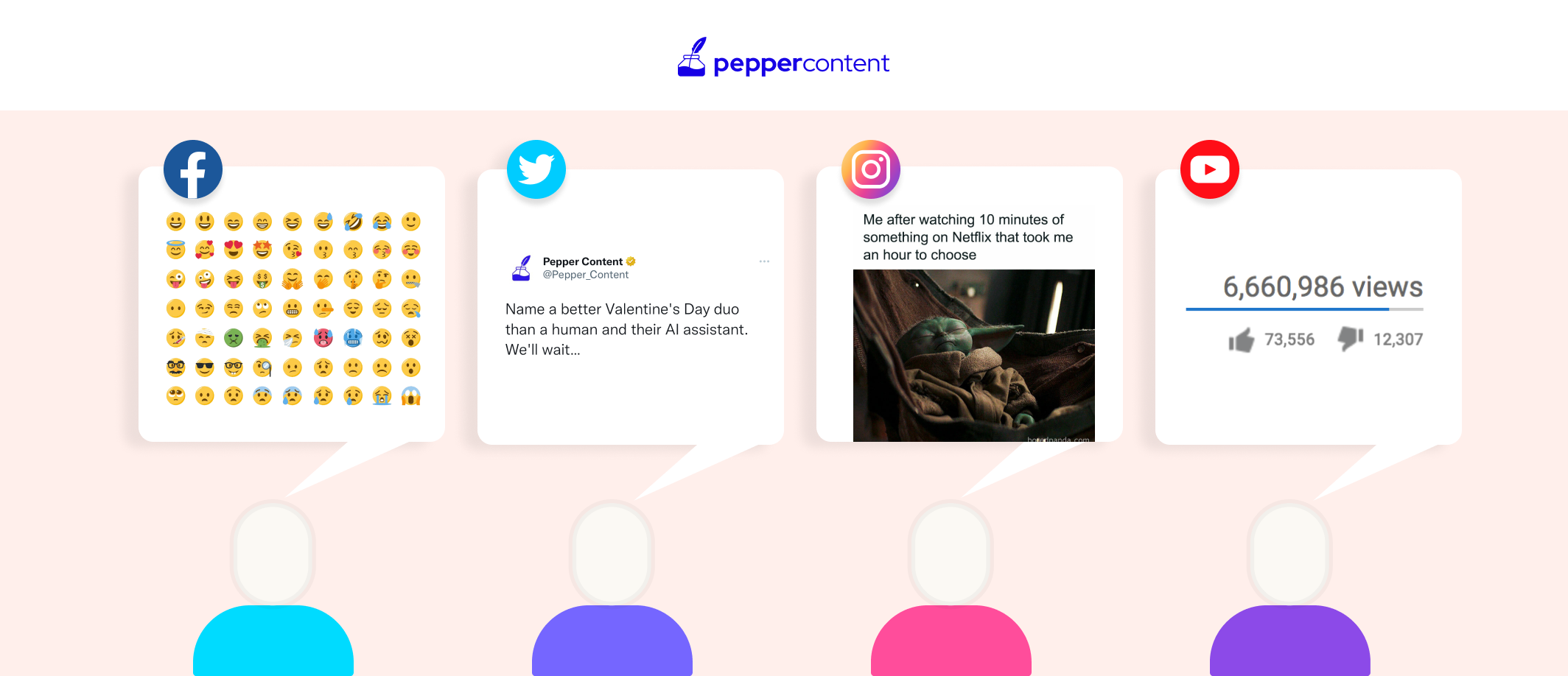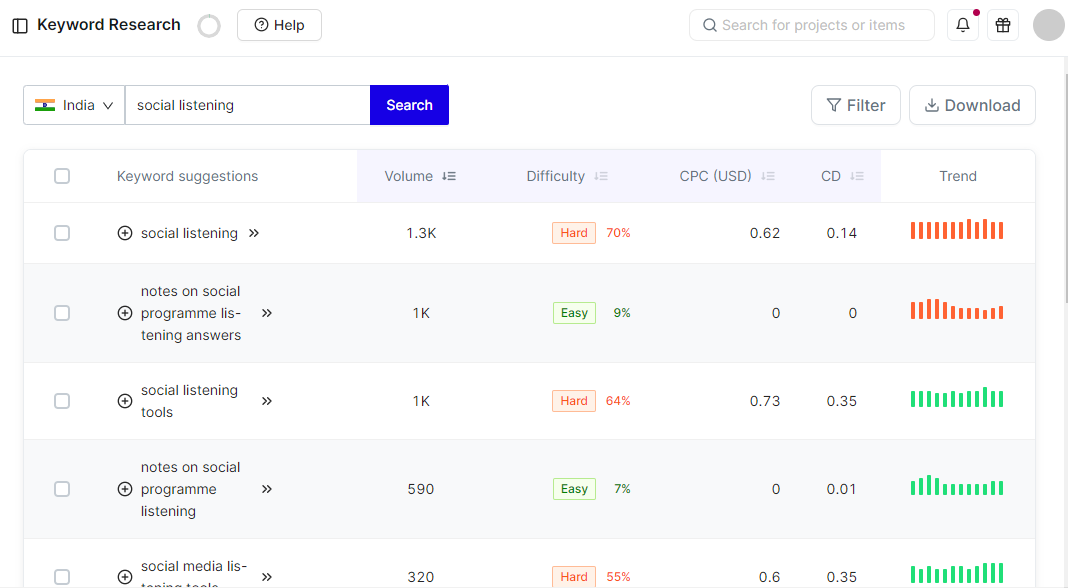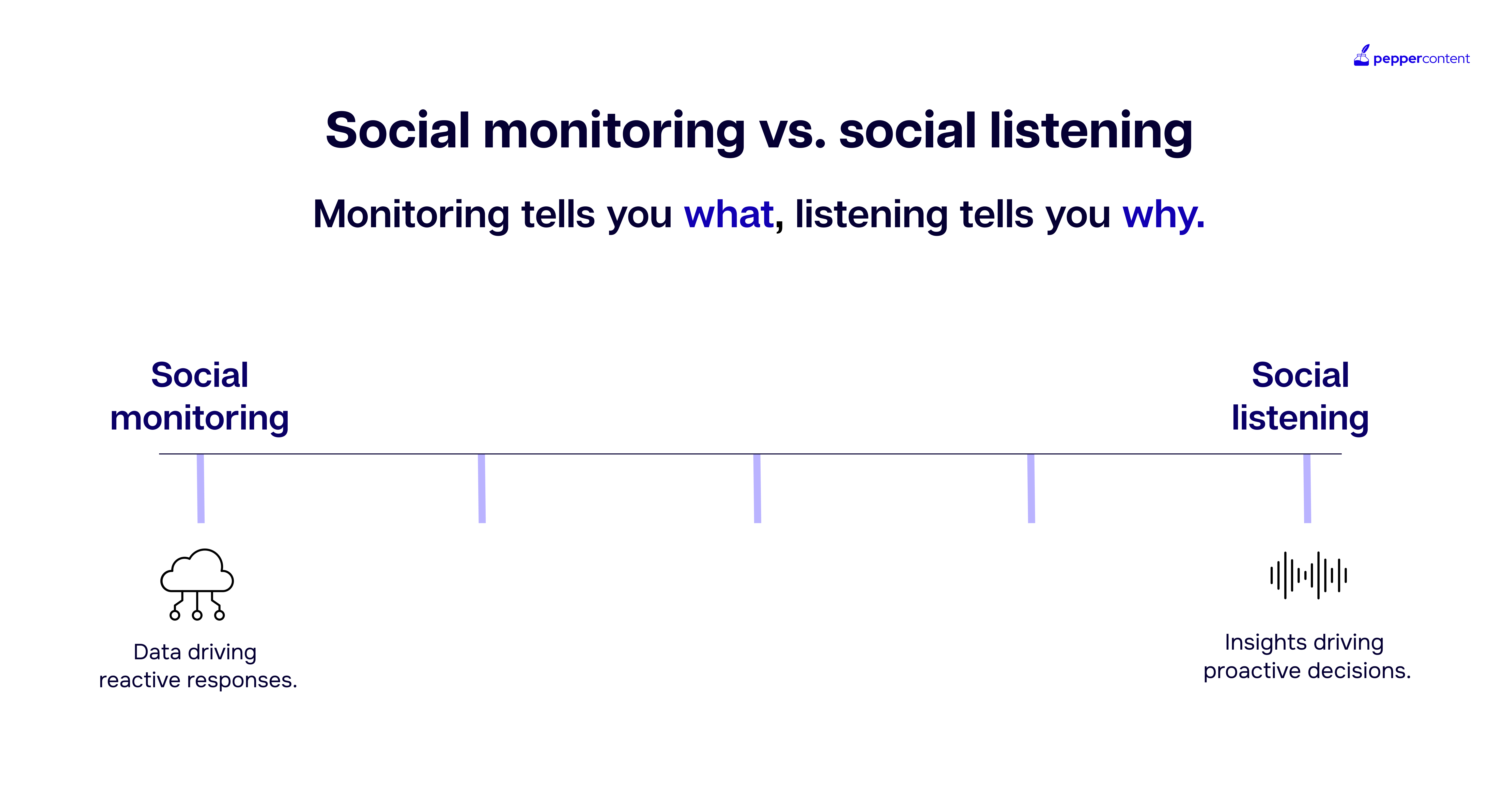Exploring the Power of Social Listening for Content Marketing Success

Welcome to the world of social listening, where understanding your audience has never been easier or more important for content marketing success. According to recent statistics, a whopping 51% of marketers are already utilizing social listening to shape their strategies. And it’s no surprise why. In today’s digital age, where people are constantly expressing their opinions and preferences online, social listening allows you to tap into the pulse of your audience.
In this article, we’ll dive deep into the world of social listening for content marketing and provide you with practical tips on how to leverage its power for brand success. Get ready to discover how social listening can transform your approach, engage your audience like never before, and ultimately boost your brand’s success. Let’s jump right in!
What is Social Listening?
Social listening is the secret ingredient that can take your content marketing strategy from good to exceptional. It involves monitoring online conversations to gain insights into customer preferences and sentiments. Gone are the days when social listening was merely about tracking brand mentions. Today, it goes beyond that, encompassing broader industry trends and customer pain points.
Imagine a company that was struggling to identify a gap in its market. By employing social listening, they can tap into conversations happening online and discover an unmet need for healthy, on-the-go snacks. This can lead them to launch a successful product line that catered specifically to health-conscious consumers looking for convenient options. That’s the power of social listening in action!
By leveraging social listening, you can stay in tune with what your audience truly wants and needs. You gain valuable insights into their preferences, behaviors, and pain points. This knowledge allows you to tailor your content marketing strategy accordingly and create content that truly resonates with your target audience.
So, how can you effectively harness the power of social listening for content marketing? Let’s dive deeper into the practical tips that will help you make the most out of this invaluable tool.
Benefits of Social Listening for Content Marketing
- One of the key benefits of social listening in content strategy is the ability to understand audience needs and preferences.
- Another benefit is the ability to stay ahead of industry trends and have a competitive edge by allowing you to create timely and relevant content that resonates with your audience.
- Social listening helps you uncover content gaps. By understanding what questions your audience is asking or what topics they are discussing, you can identify areas lacking information or resources.

Identifying Relevant Social Media Platforms
In today’s digital age, where social media platforms are teeming with conversations and opinions, content marketers must tap into this wealth of information. That’s where social listening comes in. Social listening is the practice of actively monitoring online conversations to gain insights into customer preferences, sentiments, and industry trends. It goes beyond tracking brand mentions and allows marketers to understand their target audience on a deeper level.
By actively participating in relevant conversations on platforms like Twitter, Facebook, LinkedIn, Instagram, and more, you can gain firsthand insights into your target audience’s preferences and pain points. For example, a food delivery service can use Twitter’s real-time nature to monitor customer feedback and improve the quality of its service. They can respond promptly to complaints or suggestions and make necessary adjustments to enhance the customer experience.

Setting Up Effective Social Listening Tools
To truly unleash the power of social listening, you need to have the right tools in place. Popular platforms like Hootsuite, Mention, and Brandwatch can help you efficiently manage social media monitoring and gain valuable insights.
- Hootsuite is a comprehensive social media management platform that allows you to monitor multiple platforms, schedule posts, and engage with your audience all in one place. With its robust analytics capabilities, you can track brand mentions, sentiment analysis, and audience demographics.
- Mention is another powerful tool that enables real-time monitoring of online conversations about your brand or industry. It provides you with alerts whenever your brand is mentioned, allowing you to respond promptly to customer queries or feedback.
- Brandwatch goes beyond simple monitoring by incorporating sentiment analysis and powerful data visualization features. This tool allows you to gauge the overall sentiment surrounding your brand or specific topics within your industry. For example, a hotel chain can use Brandwatch’s sentiment analysis feature to identify areas for improvement within its customer experience. Discoveries like customers consistently mentioning long wait times at check-in and poor room service, etc., can be identified. Armed with this information, the hotel chain can take immediate action to address these issues, resulting in improved customer satisfaction and loyalty.
When setting up your social listening tools, don’t forget the importance of keyword research. Identifying relevant keywords related to your industry will help you capture meaningful conversations and filter out noise. This will ensure that you are focusing on the most relevant discussions and extracting valuable insights.

Analyzing Conversations and Sentiments
In content marketing, understanding audience sentiments is crucial to creating impactful content that resonates with your target demographic. This is where social listening comes into play. By analyzing conversations and sentiments, you can gain valuable insights into how your audience feels about your brand and its offerings.
When it comes to analyzing conversations, it’s important to go beyond just surface-level mentions. Dive deep into the discussions happening online and identify recurring themes that your audience is discussing. This will give you a better understanding of their needs and preferences.
One method of analyzing conversations is through sentiment analysis. Sentiment analysis involves using natural language processing algorithms to determine whether a conversation is positive, negative, or neutral. By gauging the sentiment around your brand, you can quickly address any concerns or issues raised by customers.
By analyzing conversations and sentiments, you can also identify trends within your industry. Keep an eye on what topics are trending among your target audience and incorporate them into your content strategy. This allows you to stay relevant and create content that aligns with what your audience is talking about.
Don’t just listen to what your audience is saying; analyze their conversations and sentiments to create content that truly connects with them.

Measuring Success with Analytics
Now that you have implemented social listening to shape your content marketing strategy, it’s crucial to measure its impact. Analytics provide valuable insights into how well your efforts are resonating with your audience. By tracking metrics such as engagement, reach, and conversions, you can determine the effectiveness of your content and make data-driven decisions for future campaigns.
Tools like Google Analytics or the built-in analytics provided by social media platforms can help you monitor the performance of your content. They allow you to track metrics such as website traffic, click-through rates, and social media engagement. By analyzing these numbers, you can identify which types of content are most successful and optimize your strategy accordingly.

Remember that measuring success is an ongoing process. Regularly review your analytics data and adapt your strategy based on the insights gained. This way, you can ensure that your content is continuously improving and delivering the results you desire.
To unlock the potential of social listening for content marketing success, it is crucial to understand and cater to the needs and preferences of your audience. By actively monitoring online conversations, you can gain valuable insights into customer sentiments, industry trends, and content gaps that can inform your content strategy.
This article has provided practical tips on leveraging social listening effectively.
From identifying relevant social media platforms to setting up efficient social listening tools, analyzing conversations and sentiments, tracking competitor strategies, and measuring success with analytics – social listening can revolutionize your content marketing efforts.
By personalizing your content for your target audience and collaborating with influencers who resonate with their interests, you can amplify brand reach and credibility.
Additionally, by keeping an eye on trending topics within your industry, you can create timely and viral content that engages your audience.
In conclusion, harnessing the power of social listening allows you to stay ahead of the game in the ever-evolving world of content marketing. By understanding your audience deeply and responding to their preferences and sentiments, you can create more impactful content strategies that not only engage your audience but also boost brand success. So get started today and unleash the power of social listening for content marketing success!
Introducing Pepper CMP
Most content tools work in isolation. Marketers subscribe to one tool for keyword research, sign into a marketplace to find the subject matter experts to actually create the content, use multiple spreadsheets to manage their editorial calendar and the content production process, and a plethora of other tools for analysis and more. Pepper’s Content Marketing Platform is home to the most efficient tools in the hands of a marketer. Instead of function-first, it is built with a workflow-first approach, keeping the marketer at the front and center of its technology. Find out more and leverage your social listening for content marketing.
Latest Blogs
Learn how to rank on AI search engines like ChatGPT, Perplexity, and Gemini by optimizing your content for authority, structure, and relevance. Stay ahead in AI-driven search with this strategic guide.
Explore the best healthcare SEO services for your medical practice. Improve online visibility and effectively reach more patients in need of your services.
Discover top social media agencies specializing in banking solutions, enhancing financial services and driving engagement.
Get your hands on the latest news!
Similar Posts

Demand Generation
8 mins read
Mastering the Art of Building an Effective Content Marketing Funnel in 2024

Demand Generation
6 mins read
Fueling Demand Generation: How Buyer Personas Catapult Your Content Marketing Strategy

Demand Generation
8 mins read